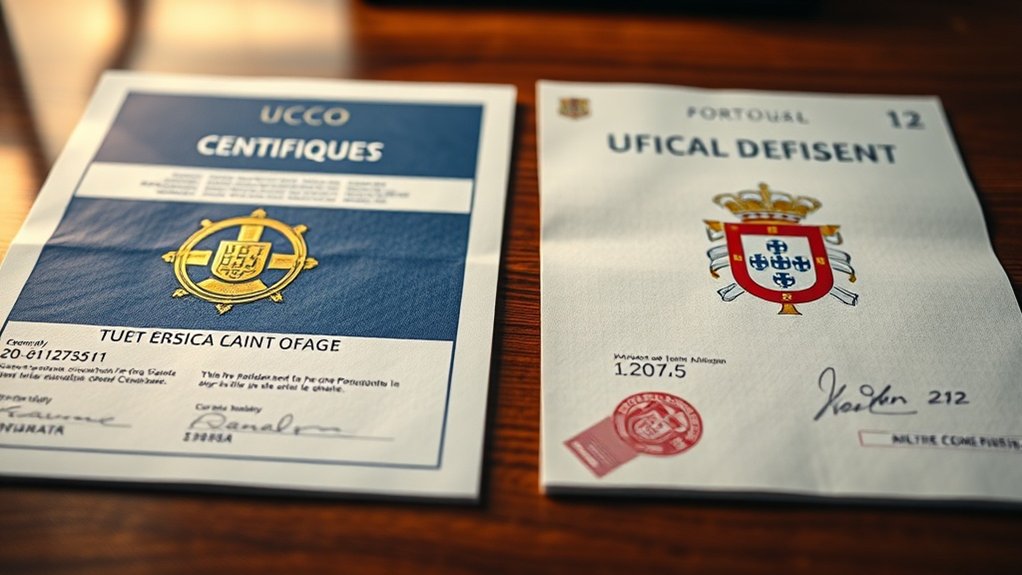You’re likely confused about whether you need a visa or residence permit for your international move, and you’re not alone in this predicament. While both documents grant legal authorization to enter or remain in a foreign country, they operate under fundamentally different legal frameworks with distinct validity periods, renewal processes, and scope of rights. Understanding these critical distinctions could mean the difference between a successful relocation and unexpected legal complications that derail your plans entirely.
Legal Framework and Authorization Scope

While both residence permits and visas serve as immigration documents, they operate under fundamentally different legal frameworks that determine your rights and obligations in a foreign country.
A visa grants you temporary authorization to enter a specific country for predetermined purposes like tourism, business, or study. It’s essentially an entry permit with limited scope, typically issued by consulates or embassies before your travel. Visas don’t guarantee residence rights and often restrict your activities within the host country.
Residence permits, conversely, provide broader authorization to live and often work in a country for extended periods. They’re governed by domestic immigration laws rather than consular regulations. You’ll typically apply for residence permits after arrival or through in-country procedures.
The legal framework surrounding residence permits usually includes comprehensive rights like healthcare access, employment authorization, and social benefits. Visas rarely provide such extensive privileges, focusing primarily on entry and short-term stay permissions.
Given the complexity of immigration laws and constant changes in regulations, seeking specialized legal support ensures proper understanding of which document type best suits your specific situation and long-term goals.
Duration and Renewal Requirements
Duration represents one of the most significant distinctions between residence permits and visas, directly impacting your long-term planning and legal status.
Visas typically grant short-term authorization, ranging from days to months, with limited renewal options. You’ll face strict deadlines and must often leave the country to apply for extensions. Most tourist and business visas don’t allow consecutive renewals beyond specific limits.
Residence permits offer substantially longer validity periods and more flexible renewal processes. You can typically renew them while remaining in the country, provided you meet ongoing requirements.
Key duration differences include:
- Initial validity period – Visas: 30-180 days; Residence permits: 1-5 years
- Renewal frequency – Visas: Often require new applications; Residence permits: Straightforward renewal process
- Renewal location – Visas: May require departure; Residence permits: In-country processing available
Understanding these timeframes helps you choose the appropriate authorization type for your intended stay duration and future plans.
Portugal’s Golden Visa residency authorization is valid for 2 years and is renewable, demonstrating how residence permits provide longer-term stability compared to traditional visa options.
Entry Rights vs. Residence Rights

Beyond timing considerations, the fundamental rights granted by visas versus residence permits differ substantially in scope and legal protection. You’ll find that visas primarily grant entry rights, while residence permits establish your legal right to remain in the country.
| Aspect | Visa | Residence Permit |
|---|---|---|
| Primary Function | Entry authorization | Legal residency status |
| Movement Rights | Temporary access | Continuous residence |
| Legal Protection | Limited duration | Enhanced stability |
| Work Authorization | Often restricted | Usually included |
| Family Rights | Minimal provisions | Comprehensive benefits |
When you hold a visa, you’re essentially receiving permission to enter and stay temporarily. However, a residence permit grants you established legal status within the immigration framework. This distinction affects everything from employment opportunities to accessing social services. Your residence permit provides stronger legal footing for long-term planning, while visas offer flexibility for shorter commitments. Understanding these differences helps you choose the appropriate immigration pathway for your specific circumstances and goals. For those seeking employment-based immigration, green card eligibility through permanent residency offers the most comprehensive long-term benefits compared to temporary visa statuses.
Application Processes and Documentation
You’ll encounter distinctly different application procedures when pursuing a visa versus a residence permit. Visa applications typically require fewer documents and process within days or weeks, while residence permit applications demand extensive documentation including proof of income, housing, and integration requirements, often taking several months to complete. Most visa applications can be submitted online or at consulates abroad, whereas residence permits usually require in-person submission at immigration offices within your destination country. Specialized legal assistance ensures proper document organization and helps prevent costly errors that could lead to application denials or delays in either process.
Required Document Types
When applying for either a residence permit or visa, you’ll need to gather specific documentation that varies significantly between these two immigration pathways.
For visa applications, you’ll typically submit:
- Basic travel documents – Valid passport, completed application form, passport photos, travel itinerary, and proof of accommodation
- Financial evidence – Bank statements, employment letters, or sponsorship documentation demonstrating sufficient funds for your stay
- Purpose-specific papers – Tourist vouchers, business invitations, or educational enrollment confirmations depending on your visit type
Residence permit applications require more comprehensive documentation, including criminal background checks, medical certificates, proof of local address, employment contracts, and extensive financial records. You’ll also need translated and apostilled documents from your home country, making the process considerably more complex than standard visa applications. Given the complexity and constant updates of Brazilian immigration laws, seeking legal guidance throughout the entire process can significantly increase your chances of approval with properly organized documentation.
Processing Timeline Differences
The complexity of documentation you’ll need directly impacts how long you’ll wait for approval. Visa applications typically process within 15-30 days since they require standard documents like passport copies, financial statements, and travel itineraries. You’ll submit these through consulates or online portals with straightforward verification procedures.
Residence permits demand significantly longer processing times, often 60-180 days, because authorities must verify extensive documentation including criminal background checks, medical certificates, employment contracts, and housing proof. You’ll face multiple review stages involving different government departments.
Emergency visa processing can accelerate approval to 24-48 hours for additional fees. However, residence permits rarely offer expedited processing since thorough background verification can’t be rushed. Plan accordingly—apply for residence permits well before your current legal status expires.
Specialized legal assistance can help you navigate these complex timelines and ensure all required documentation is properly organized and submitted to avoid delays that could jeopardize your immigration status.
Submission Method Variations
Beyond timing differences, visa and residence permit applications follow entirely different submission pathways that’ll determine where, how, and with whom you interact throughout the process.
Visa applications typically require you to submit documents at consulates or embassies in your home country before traveling. You’ll complete most paperwork remotely and attend interviews abroad.
Residence permit applications happen after you’ve arrived in your destination country. You’ll submit documents directly to immigration offices or authorized centers within the country’s borders.
Key submission differences include:
- Location requirements – Visas from abroad vs. residence permits from within the country
- Documentation format – Consular requirements vs. local administrative standards
- Interview processes – Embassy appointments vs. domestic immigration meetings
Understanding these pathways helps you prepare appropriate documentation and expect different procedural experiences.
Given the complexity of immigration laws and their constant updates, obtaining specialized legal support ensures you navigate these different submission processes correctly and avoid costly errors that could jeopardize your immigration plans.
Rights and Obligations for Holders
Your legal status directly determines what you’re allowed to do in your host country. With a residence permit, you’ll typically enjoy broader work authorization and healthcare access compared to most visa holders. However, you’ll also face specific travel restrictions and movement limitations that vary significantly between these two immigration statuses. Given the complexity and frequent updates in immigration laws, consulting with an immigration lawyer ensures you understand your specific rights and obligations under each status.
Work Authorization Differences
How drastically do work authorization rights differ between residence permits and visas? The distinction impacts your career opportunities and employment flexibility significantly.
With a residence permit, you’ll enjoy broader work authorization that typically allows employment across multiple sectors without requiring additional approvals. You can change jobs, start businesses, or pursue freelance work more freely.
Visa holders face more restrictive work authorization:
- Employer-specific restrictions – You’re often tied to the sponsoring employer who petitioned for your visa
- Sector limitations – Your work authorization may be limited to specific industries or job categories
- Additional approval requirements – Changing employers or job roles frequently requires government pre-approval
Understanding these work authorization differences helps you make informed decisions about your immigration status and career planning in your destination country. Given the complexity of immigration laws and frequent policy changes, consulting with experienced lawyers can prevent costly errors and visa denials that could jeopardize your work authorization status.
Healthcare Access Rights
Healthcare access represents another fundamental area where residence permits and visas create vastly different experiences for immigrants. With a residence permit, you’ll typically gain access to the country’s public healthcare system, often enjoying the same medical benefits as citizens. You can register with local doctors, receive subsidized treatments, and access emergency services without facing significant barriers.
Visa holders, however, face more restrictive healthcare access. You’re usually required to maintain private health insurance throughout your stay, and public healthcare benefits may be limited or entirely unavailable. Emergency treatment is generally provided, but routine medical care often comes at full cost. Long-term medical needs become particularly challenging under visa status, making residence permits significantly more advantageous for comprehensive healthcare coverage.
Given the complexity of immigration regulations and their impact on healthcare entitlements, seeking specialized guidance from immigration attorneys ensures you understand your specific rights and obligations under each status type.
Travel Movement Restrictions
While healthcare access differs significantly between permit types, travel movement restrictions reveal equally stark contrasts in your freedom of mobility. Your residence permit typically grants you unrestricted travel within your host country and often extends to regional agreements like Schengen zones. You can leave and return multiple times without additional authorization, provided your permit remains valid.
Conversely, your visa usually imposes stricter limitations on movement. Here’s what you’ll face:
- Single or limited entry allowances – You can’t freely exit and re-enter without risking permit cancellation
- Geographic restrictions – Your movement may be confined to specific regions or cities
- Exit visa requirements – Some countries mandate special permits before you can leave
These restrictions directly impact your ability to travel for business, family visits, or emergencies.
Conversion Pathways Between Document Types
Converting from one immigration document type to another often requires navigating complex bureaucratic processes that vary significantly between countries. You’ll typically find that transitioning from a visa to a residence permit involves demonstrating continuous legal status and meeting specific eligibility criteria.
Most countries offer structured pathways for document conversion, though requirements differ substantially. You can’t simply exchange one document for another—each conversion demands fresh applications, updated documentation, and often extended processing periods.
| Document Transition | Processing Time | Key Requirements |
|---|---|---|
| Tourist Visa → Work Permit | 2-6 months | Job offer, employer sponsorship |
| Student Visa → Residence Permit | 3-8 months | Degree completion, employment contract |
| Work Visa → Permanent Residence | 1-3 years | Continuous employment, language proficiency |
| Temporary → Permanent Status | 6 months-2 years | Tax compliance, clean criminal record |
You’ll need to maintain legal status throughout the conversion process. Some jurisdictions allow in-country applications, while others require you to return to your home country during transitions.
Common Violations and Legal Consequences

Understanding immigration violations becomes crucial once you’re navigating the complex world of visas and residence permits. You’ll face serious legal consequences if you breach the terms of your documentation, regardless of whether you hold a visa or residence permit.
The most frequent violations include:
- Overstaying your authorized period – Remaining beyond your visa’s expiration date or residence permit’s validity can result in immediate deportation, entry bans ranging from 1-10 years, and hefty fines.
- Working without proper authorization – Engaging in employment activities outside your visa category or residence permit conditions leads to document cancellation, criminal charges, and permanent immigration record damage.
- Failing to maintain legal status requirements – Not updating address changes, missing renewal deadlines, or violating specific permit conditions triggers automatic status revocation.
You’ll discover that penalties vary significantly between countries, but violations typically result in removal proceedings, future visa denials, and potential criminal prosecution depending on severity.
Frequently Asked Questions
What is the difference between a visa and a residence permit?
A visa allows entry into a country for a limited time, while a residence permit authorizes longer-term living and sometimes working.
What is the difference between a visa and permit?
A visa is usually for entry and short stays, whereas a permit gives legal status to reside, study, or work.
What is the difference between visa validity and duration of stay?
Visa validity is the total period the visa can be used; duration of stay is how long one can remain per entry.
What is the difference between validity and duration?
Validity refers to the overall timeframe a document is active, while duration is the time of actual use or stay allowed.
Can I Work Remotely for Foreign Companies With a Residence Permit?
You can typically work remotely for foreign companies with a residence permit, but it depends on your specific permit type and the country’s regulations. Some residence permits restrict employment activities, while others allow unrestricted work. You’ll need to check your permit conditions and local tax obligations. Remote work for foreign employers often creates complex tax situations, so you should consult immigration and tax professionals to ensure compliance.
What Happens if My Passport Expires Before My Residence Permit?
You’ll need to renew your passport before it expires to maintain your legal status. Your residence permit remains valid, but you can’t travel internationally without a valid passport. Contact your country’s embassy or consulate immediately to start the renewal process. You’ll also need to update your residence permit with the new passport information through the relevant immigration authorities once you receive your renewed passport.
Are There Different Fees for Visa Versus Residence Permit Applications?
Yes, you’ll pay different fees for visa versus residence permit applications. Visa fees are typically lower since they’re temporary authorizations, while residence permit fees are higher because they grant longer-term legal status. The exact amounts vary by country, permit type, and your nationality. You should check the specific immigration authority’s fee schedule, as costs can range from modest visa fees to substantial residence permit processing charges.
Can Family Members Automatically Get Documents if I Have Residence Permit?
No, your family members can’t automatically get documents just because you have a residence permit. They’ll need to apply for their own permits through family reunification procedures. You must meet specific requirements like proving adequate income, housing, and health insurance. Each family member needs separate documentation, and there’s usually a waiting period before you’re eligible to sponsor them. The process isn’t automatic.
Which Document Is Better for Applying for Permanent Residency Later?
A residence permit’s better for applying for permanent residency later. You’ll have an easier pathway since you’re already established as a legal resident with documented time in the country. Residence permits typically offer more stability and continuity in your legal status. Visas often require multiple renewals and status changes, which can complicate your permanent residency application timeline and create gaps in your documentation history.
Conclusion
You’ll find that choosing between a residence permit and visa depends on your long-term plans and legal status goals. If you’re planning extended stays with work authorization, you’ll need a residence permit for its broader rights and longer validity. However, if you’re making short visits for business or tourism, a visa meets your needs. You should consult immigration attorneys to ensure you’re selecting the appropriate document type and avoiding potential legal violations.




